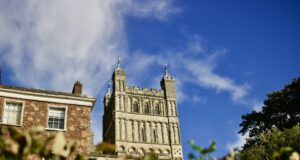St Francis of Assisi – Part One
At the G7, David Attenborough called for urgent, immediate action. The patron saint of Ecology is St Francis of Assisi, who like Christ, whose life and suffering he lived to imitate, achieved his place in history through the small, the insignificant, the damaged, and then discarded. He lived out that about which he spoke.
Francis [1181 to 1226] was born in Assisi, Umbria. His father was a rich cloth merchant and his mother doted on the boy. In the city, that was constantly at war with neighbouring Perugia, he knew how to spend money with his girlfriend, Clare. He sang French love songs [hence his name: Francesco] and longed to achieve glory in battle, only to be imprisoned in Perugia, returning eventually to Assisi humiliated and depressed.
There on the streets was a common sight: a leper, with all the wasting that goes with the disease. Embarrassingly for his parents, there in the city square Francis stripped naked, feeling a desire to identify with the most rejected. His furious father locked him up, only to be released in secret by his mother. Wandering into a tiny chapel, he found Matthew’s gospel open on a lectern. He read the words: ‘You must take up your own cross and follow me.” The words ‘your OWN cross…’ were the most challenging. Thus, he sought out the leper and held him tightly in his arms! Why? He saw Christ in the most rejected and then loved what he saw through service.
Down the hill from Assisi, there was a little ruined church, which had a large hanging crucifix, which had always captivated Francis. Standing before it, he ‘heard the words, apparently from the crucifix: ‘Francis. Rebuild my Church’. Francis took the words literally and spent months restoring the little Church, but, of course, it took time for him to realise that his task was the restore the whole Church to following Christ. Large trees from small acorns….!
For the rest of his life, he travelled up and down Italy many times gathering men and women into his disturbing life of poverty and simplicity, lived through deep prayer and loving – and, of course, walking. He set up little ‘cells’ in caves on the sides of mountains, where he and his friends gave time to silence. One such mountain was Monte La Verna, Tuscany. He had wanted so much to identify with Christ’s sufferings that he was given what he asked for – the wounds of love in his hands, his feet and his side. The stigmata. Whether you accept that literally or not, isn’t the point. His life was, quite simply, Christ-like.
His relationship with the earth, through walking and crucially ‘listening’ to the natural world, gave the powerful impression that he was able to relate to the world of birds and animals. That relating was – and is – the work of Christ – at THIS moment.
For me, still, the best book on Francis is by Omer Englebert. It’s a good read.
Four small actions in the spirit of Francis.
1. Find out what agreements were made at the G7 and what informed people feel about those agreements.
2. Read a Gospel from start to finish. St Mark is the shortest. What is this reading asking of YOU?
3. Look at the natural world around you at THIS moment. Looking is praying.
4. Reduce your carbon footprint. The waste in your home… Large trees from small acorns….
A prayer attributed to St Francis:
O God, make me an instrument of your Peace,
Where there is hatred let me sow love,
Where there is injury pardon,
Where there is doubt faith,
Where there is despair hope,
Where there is darkness light
Where there is sadness joy.
O divine Master, grant that I may not so much
Seek to be consoled as to console,
To be understood as to understand,
To be loved as to love.
For it is in giving that we receive,
It is in pardoning that we are pardoned,
And it is dying that we are born to eternal life.
Amen.


















